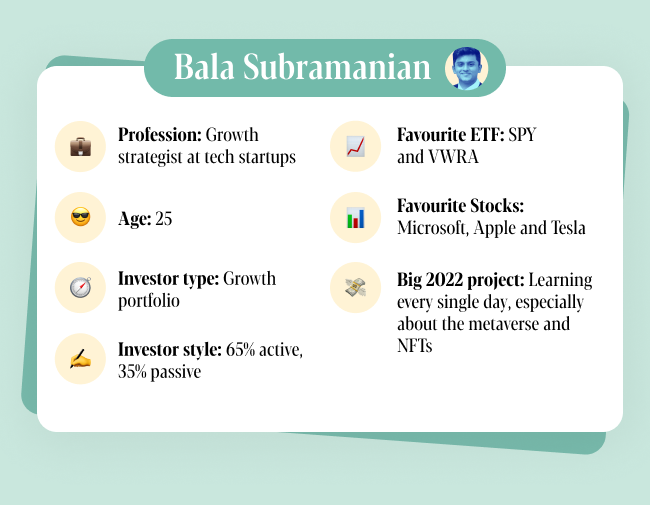When it comes to money, people can be broken up into two supertribes – those who save and those who don’t.
Bala Subramanian could name both types of people within his family back home in India. Luckily, it was the “more conservative” super-saver family members that rubbed off on him the most.
He now counts his blessings that he was fortunate enough to adopt the ritualistic-saving and not spend-thrift mentality early on in life.
Today living in Dubai, Bala has learned that building consistent savings habits is the prerequisite to investing. In turn, investing has become a new superskill that he began putting into practice as far back as October 2019 when he was just 22 years old. Quickly, he witnessed just how the stock market provides wealth-building powers that bank accounts can never compare to.
He should know, having started trading in Tesla and Microsoft several years ago, as well as successfully playing out the Gamestop saga that was the height of Wall Street madness in early 2021.
However, making the jump from being a good saver to savvy investor is by no means the default journey.
“Growing up, I had the tendency to save a lot of money,” remembers Bala. “But then I encountered a common mistake, where you just save money to put in your bank every month. There is no extra wealth you build from that, so that’s where my dad stepped in.”
Bala’s dad chose mutual funds as his go-to investment, and this served as a great source of foundational knowledge for Bala as he began to pick apart the stock market, company equities, bonds, ETFs and the overall meaning of investing today.
But, perhaps most importantly, the 25-year-old investor has now gleaned one of the most crucial components of investing early on in his life – understanding the market helps you better understand the world.
“More than investing and getting money, this whole experience for me has been about learning and gaining so much knowledge about how the world works,” says Bala.

Sarwa wanted to hear more about Bala’s journey from super-saver to investor – including all the ups and downs that he has learned from since he began investing in 2019.
What inspired you to begin investing back in October 2019 at the age of just 22?
All I ever heard about investing was from my dad, and I was never that interested, to be honest. But then in 2019, a few of my friends from college mentioned this thing called Sarwa, which just launched. We went to the webinar and heard more about investing in the UAE.
I found the concept of passive investing very intriguing.
Like, if you just put X amount of money into the market every month, how much returns you’re able to get over a period of time. If you just forget about it (that is, passively invest) and live your general life, you’ll see the kind of returns that you can never expect to get with a savings account.
After learning about passive investing, something that intrigued me was that if I was spending X amount of money on some things that I didn’t need, I might as well put that into an investment that can help me later on.
I started asking myself a lot of questions about my spending habits and where I was going in the future.
Getting into the market in October 2019 must have brought lots of gains given the stock performance since then. Would you say you made the correct move to start so early?
Yes, just by getting started I made the correct move. This is something that I have even told all my friends. Even if you put just $5 into the market, you will naturally be intrigued to know where you put it, and that will make you want to learn more about the whole market.
During the pandemic, I found myself changing my habits to learn more about a particular stock or gain general knowledge. I used to spend a lot of time just sitting and playing games or something, but now I have started to find more time to educate myself.
Now, there is active and passive investing. How do you balance these two strategies?
When Sarwa launched in 2019 and I began using the platform, my whole strategy was to passively invest – they’re putting all my money to work for me.
Then, I wanted to know how I can buy my own stocks as well. So, I thought of diversifying my portfolio game and I put a lot of money in individual stocks. As you know, 2020 was an unusual year – there were meme stocks and a lot of retail investors entering the market.
It ended up being really great timing for me. I learned a lot of things just from entering into the market.
We have to ask: What was the worst stock trading mistake you made during this period?
Following YouTubers is good to an extent, but you should not just blindly believe them. It’s good to know about what stocks are out there and why they are being hyped, but it’s also important to learn the fundamentals of the company that you’re investing in rather than just putting your money in it and forgetting about it.
I used to follow some YouTubers: When they made a move, I made a move; it was that kind of a strategy for me in 2020. I saw a lot of returns, to be honest, but that’s because 2020 was an unusual year. Then, I lost a lot of money because I never pulled out of some stocks. The second 2021 came into the picture, they crashed. It literally all just crashed.
So, that was the worst, say move I’ve made – not pulling out more and just blindly following people without doing my own due diligence.
Any specific stocks you could classify as ‘worst moves’?
There is a stock called Workhorse – an electronic vehicle company that was looking to get a contract from the US Postal Service. It went from $4 to $56. And I had invested when it was at $10, I think.
It never got the USPS contract. Today, it’s back and $4 and I’m still stuck with it.
And what were your best trades?
I can define the best trade in two ways – the most profitable and the best from a long-term wealth building perspective.
My most profitable trade was GameStop. When the whole Gamestop madness happened, I used to buy and sell, buy and sell, buy and sell it to play with price fluctuations.
However, my best trades that have given me consistent returns are, of course, Microsoft, Apple, and Qualcomm. (Sarwa note: Indeed, Apple and Microsoft are among the most stable earnings growers in the world, and are the top holdings for the S&P 500 and Nasdaq indexes.) So I put a lot of money in these three stocks. Of course, these three companies have strong fundamentals and great leadership.
Finally, it has been said that smart investors learn to get rich slowly. What do you think of this concept?
It is reflective of my current strategy. Yes, they do get rich slowly. But at the same time, I think it’s important to go out and make an attempt to understand how the market really works, as well as what trends are influencing its future.
For example, very conservative investors might not get involved in crypto or crypto-related stocks. Why? Because they don’t know what it is.
But this is a missed opportunity. Smart investors are people who learn to diversify across passive investing plays in ETFs, putting money into stable company plays like Apple and X amount of money into speculative plays like crypto – or even NFTs or whatever.
I think it’s good to manage ways to be both conservative and speculative.
